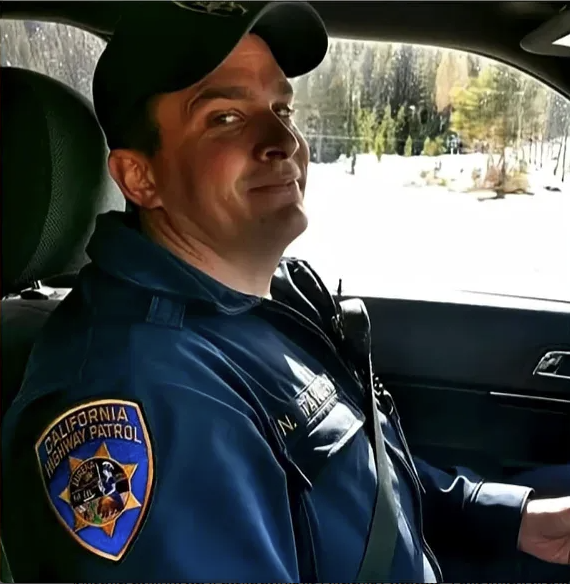
Nathan picked up a hitchhiker at Donner Summit and offered kindness instead of harassment—sharing stories, giving his phone number, and promising help. The hitchhiker planned to thank him with beer or dinner.
Two weeks later, he learned Nathan had been killed on duty, struck by a car.
Now, he honors Nathan by sharing his story, inspiring others to be good, because later may never come.
Nathan picked up a hitchhiker at Donner Summit. That alone is noteworthy—most people don’t stop for hitchhikers anymore. Safety concerns, fear of strangers, busy schedules. But Nathan, a California Highway Patrol officer, saw someone who needed help and stopped.
And he offered kindness instead of harassment. That detail suggests the hitchhiker expected potential trouble—law enforcement questioning why they’re hitchhiking, suspicion, maybe hassling them to move along. But Nathan did the opposite. He shared stories, gave his phone number, promised help if needed. Treated the hitchhiker like a person worth knowing rather than a problem to manage.
The hitchhiker planned to thank him with beer or dinner. Because that kindness mattered. Because Nathan had done something rare—used his position as officer not to intimidate but to help, to connect, to make someone feel human rather than suspicious. The hitchhiker wanted to acknowledge that, repay it somehow with a simple gesture of gratitude.
Two weeks later, he learned Nathan had been killed on duty. Struck by a car. The sudden, violent death that’s always a risk for law enforcement, especially highway patrol officers working traffic incidents. One moment you’re helping someone, the next a vehicle strikes you and everything ends.
The hitchhiker never got to buy Nathan that beer or dinner. Never got to say thank you properly, to tell him how much that kindness meant. Nathan died before “later” could come, before gratitude could be expressed, before the relationship that began with a hitchhiking ride could develop into friendship.
Now, he honors Nathan by sharing his story. Because Nathan can’t be thanked directly anymore, but his kindness can be memorialized. The hitchhiker keeps Nathan’s memory alive by telling people about the highway patrol officer who stopped for a stranger, offered friendship instead of suspicion, gave his phone number and promised help.
“Inspiring others to be good, because later may never come.” That’s the lesson Nathan’s death teaches. We assume we’ll have time later—to thank people, to be kind, to build relationships, to express gratitude. But later isn’t guaranteed. Nathan didn’t know that hitchhiking ride would be one of his last acts of kindness. The hitchhiker didn’t know he’d never get that chance to buy dinner.
The photo shows Nathan in his California Highway Patrol uniform, smiling, looking exactly like the kind of officer who would stop for hitchhikers and offer kindness. Young, friendly, the type who became law enforcement to help people rather than exert authority. Gone too soon because a car struck him while he was on duty.
This story challenges how we think about law enforcement interactions. Too often, encounters between officers and civilians—especially those in vulnerable positions like hitchhikers—are adversarial. Nathan demonstrated a different way: seeing people as humans first, offering help rather than suspicion, building connections rather than maintaining professional distance.
It reminds us that everyone we meet might not get a “later.” Nathan won’t. The hitchhiker won’t get to thank him properly. If you’re waiting to express gratitude, to be kind, to help someone—do it now. Because cars strike officers, heart attacks happen, accidents occur, and suddenly “later” is gone forever.
And it shows how profound impact survives death. Nathan is gone, but the hitchhiker he helped is telling his story. That kindness ripples outward—inspiring others who hear about Nathan to be good, to help strangers, to choose connection over suspicion. Nathan’s last act of kindness continues affecting people he’ll never meet.
The hitchhiker planned to thank Nathan with beer or dinner. Instead, he thanks him by ensuring Nathan’s kindness becomes lesson for everyone who hears this story: Be good now. Help people now. Express gratitude now. Because later may never come, and the kindness you show today might be the last gift you give.